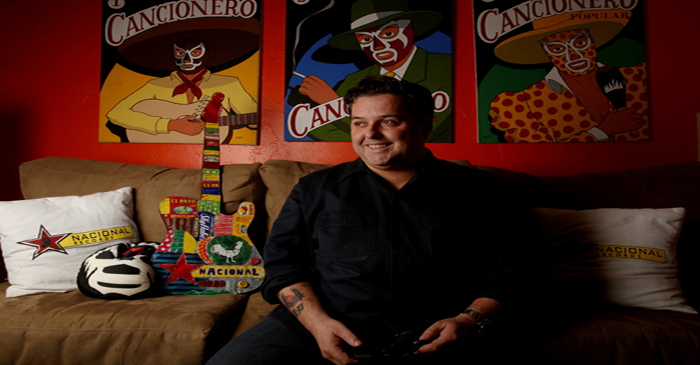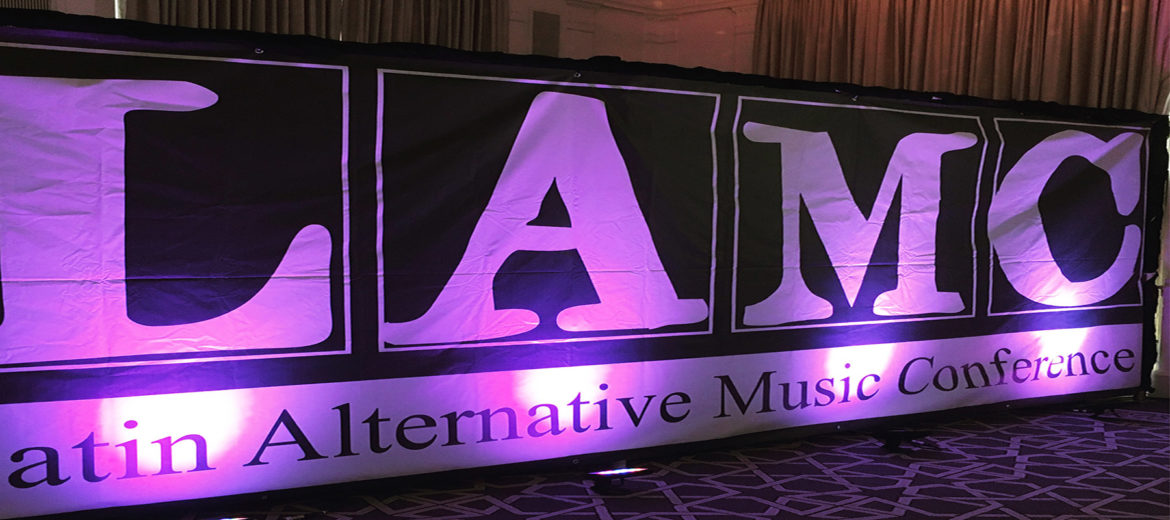
From July 10th to the 14th thousands of people will rush New York City to tap into the pulse of the Latin music world. The Latin Alternative Music Conference – the biggest event of its kind catering entirely to the Latino music industry – will be held the Big Apple. The festivities include a wide array of industry panels, movie screenings and of course, performances. We had a chance to chat with the founder of LAMC and CEO of Nacional Records, Tomas Cookman on how LAMC came to be and the good, bad and ugly of putting all together.
From CBGB to LAMC
A career in music was destined for Tomas, the Boricua grew up in New York City’s Lower East Side and his neighborhood served as the backdrop for the punk rock movement in the 70’s and 80’s. As a drummer for a band named Colors, Tomas would take part in that movement, as the one and only Hilly Crystal, then owner of CBGB’s, managed him. This meant gigs there every other weekend, drink tickets and free admission whenever they wanted. It also meant the best education any musician could ask for.
Yet, after the punk scene faded Tomas moved to Argentina where he would transition from being an artist to managing them, starting with groups Los Fabulosos Cadillacs and Manu Chao. As their careers and music flourished Tomas wanted to do more, he wanted to find a way to give everyone access to what he had. Thus LAMC was born.
LAMC started in 2000 after years of frustration with how Latin music was handled in existing conferences. “It’s interesting because I remember back in the day we would have a panel at CMJ and other music conferences at the time and they always made it seem like someone was throwing us a bone by having a Latino panel. It was always packed. So, I remember thinking well no, we can do this and do this even better.”
Do it better they did. LAMC is now described by the New York Times as “The Sundance of Latin Music” as it serves as an incubator for up-and–coming talent. Everyone from Pitbull to Kinky to Bebe have graced the stages. It’s one of Tomas’ proudest accomplishments, “A few years ago we had an artist perform named Bebe, I didn’t know who she was at the time and we gave her a Central Park show. Then a couple months later at the Latin Grammys she had six nominations. Or even Calle 13 – when they first played they weren’t ‘Calle 13’ yet. So, it’s been wonderful to see their phenomenal growth, and many others, we’ve had so many acts that have done so much for the arts and culture here in the United States and abroad as well. I think it helps a lot that I am and was originally an artist manager so I have always been very artist friendly. I love the whole idea of ‘build it and they will come.’ Well we built it and people came.”
So what’s next for the conference? “I’d like to see more young people get involved. I’d like to see more young students. I’d like to see education having a bigger part, because that’s what’s coming. We need smarter people in the industry because this is a changing industry and it’s filled with opportunities.”
Being a vet in the game, Tomas has a wealth of experience and information to share with anyone trying to break into the music industry today. Here’s his take on the good, bad and the ugly.
The Good
“The good is when you see it be successful and you don’t know that till the end of the first day. That’s the real good, even the great. It’s a wonderful feeling when you see people walking around and they are excited to be there and they are holding their conference badges and they are talking to people and they’re sharing their music with everybody. You just hear that hum in the air. Its just people that are taking the opportunity to look around and work the room and make connections.”
The Bad
“The bad part is having to pay for everything first, upfront. Everything is expensive – every plane ticket, every rental, etc., but as the saying goes you got to be in it to win it. When you are running an independent company and you have so many other projects going on, it all adds up really quick.”
The Ugly
“The ugly is when you hear somebody talk crap. Because there is always going to be haters and always going to be people who are just negative. Typically it goes hand-in-hand with someone who didn’t get booked for something or who just realized their career is not going to do it. Yeah, you got to take the ugly with everything else. It’s fine. If that’s the ugliest than it’s really not a bad thing. There really isn’t anything else uglier than that because people are just so supportive. I’m lucky to have a wonderful team of people that work here with me who get it and don’t mind going the extra mile. Because when you do something like this you need to have that spirit – like let’s just roll up our sleeves and do whatever it takes to make sure this gets done.”
Advice
“The most important thing is you have to keep on writing songs. Never forget the importance of a song. No matter how important you are or how out there you are, you still need to have a million songs to get to that next level. Then after that I think it’s important to read about the industry, it’s important to see what else is happening and to protect yourself; especially now [that] the digital realm is changing so much. With the business changing so much you have to watch out. Back 10 years ago you didn’t think about the bigger picture things because you [were] so removed from it (as an artist). Now with things being a lot different you are not that removed. So, if Google is changing their price point maybe that is going to affect you a little bit. Or things like SoundExchange; you should know what SoundExchange is and be signed up for it. You should know enough to register your songs. You should have the basic knowledge of what songwriting is and how to write a song and split songwriting with other people. It’s a complex business and that whole cliché of that crazy, drugged out rock star – that’s either BS or a majority of those people will crash and burn.
LAMC is going on from July 6th-9th all over New York City. For a full listing of events visit www.latinalternative.com.

